高一阅读
- 格式:doc
- 大小:104.50 KB
- 文档页数:12
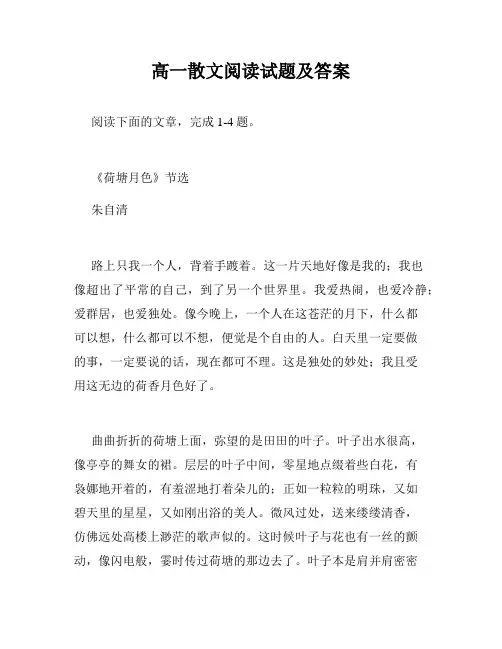
高一散文阅读试题及答案阅读下面的文章,完成1-4题。
《荷塘月色》节选朱自清路上只我一个人,背着手踱着。
这一片天地好像是我的;我也像超出了平常的自己,到了另一个世界里。
我爱热闹,也爱冷静;爱群居,也爱独处。
像今晚上,一个人在这苍茫的月下,什么都可以想,什么都可以不想,便觉是个自由的人。
白天里一定要做的事,一定要说的话,现在都可不理。
这是独处的妙处;我且受用这无边的荷香月色好了。
曲曲折折的荷塘上面,弥望的是田田的叶子。
叶子出水很高,像亭亭的舞女的裙。
层层的叶子中间,零星地点缀着些白花,有袅娜地开着的,有羞涩地打着朵儿的;正如一粒粒的明珠,又如碧天里的星星,又如刚出浴的美人。
微风过处,送来缕缕清香,仿佛远处高楼上渺茫的歌声似的。
这时候叶子与花也有一丝的颤动,像闪电般,霎时传过荷塘的那边去了。
叶子本是肩并肩密密地挨着,这便宛然有了一道凝碧的波痕。
叶子底下是脉脉的流水,遮住了,不能见一些颜色;而叶子却更见风致了。
月光如流水一般,静静地泻在这一片叶子和花上。
薄薄的青雾浮起在荷塘里。
叶子和花仿佛在牛乳中洗过一样;又像笼着轻纱的梦。
虽然是满月,天上却有一层淡淡的云,所以不能朗照;但我以为这恰是到了好处——酣眠固不可少,小睡也别有风味的。
月光是隔了树照过来的,高处丛生的灌木,落下参差的斑驳的黑影,峭楞楞如鬼一般;弯弯的杨柳的稀疏的倩影,却又像是画在荷叶上。
塘中的月色并不均匀;但光与影有着和谐的旋律,如梵婀玲上奏着的名曲。
1. 请分析文章中“荷塘月色”的描写对表达作者情感的作用。
答案:文章中“荷塘月色”的描写,通过对荷塘的宁静、月色的朦胧以及荷香的清新的描绘,传达了作者在独处时的自由、宁静和愉悦的情感。
荷塘的宁静象征着作者内心的平和,月色的朦胧则反映了作者对现实世界的超然态度,而荷香的清新则象征着作者对自然的热爱和对生活的积极态度。
这些描写共同构成了一幅和谐的画面,使得读者能够感受到作者在自然中寻找精神慰藉的情感。
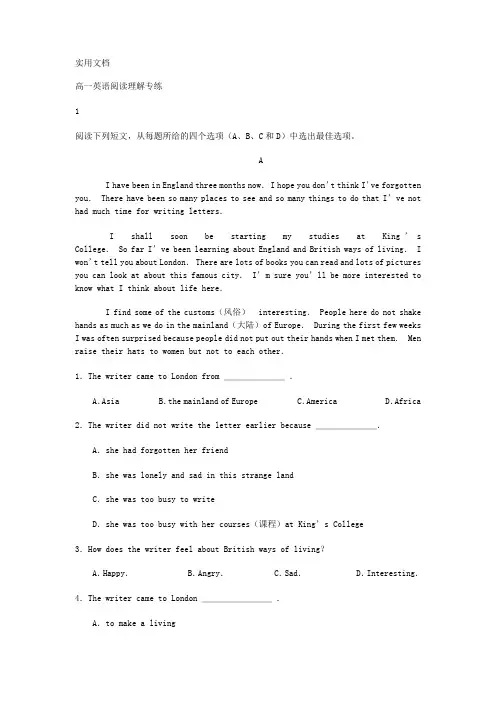
高一英语阅读理解专练1阅读下列短文,从每题所给的四个选项(A、B、C和D)中选出最佳选项。
AI have been in England three months now. I hope you don’t think I’ve forgotten you. There have been so many places to see and so many things to do that I’ve not had much time for writing letters.I shall soon be starting my studies at King’s College. So far I’ve been learning about England and British ways of living. I won’t tell you about London. There are lots of books you can read and lots of pictures you can look at about this famous city. I’m sure you’ll be more interested to know what I think about life here.I find some of the customs(风俗)interesting. People here do not shake hands as much as we do in the mainland(大陆)of Europe. During the first few weeks I was often surprised because people did not put out their hands when I met them. Men raise their hats to women but not to each other.1.The writer came to London from _______.A.Asia B.the mainland of Europe C.America D.Africa2.The writer did not write the letter earlier because _______.A.she had forgotten her friendB.she was lonely and sad in this strange landC.she was too busy to writeD.she was too busy with her courses(课程)at King’s College3.How does the writer feel about British ways of living?A.Happy. B.Angry. C.Sad.D.Interesting.4.The writer came to London ________.A.to make a livingB.to studyC.to learn British ways of livingD.for sightseeing only5.Englishmen _______.A.do not often shake hands with friends when they meetB.often shake hands when they meet with friendsC.raise their hats to all friends when they meetD.do not raise their hats to any of their friends when they meetBA young father was visiting an old neighbor. They were standing in the old man’s garden, and talking about children. The young man said,“How strict should parents be with their children?”The old man pointed to a string(绳子)between a big strong tree and a thin young one.“Please untie(解开)that string,” he said. The young man untied it, and the young tree bent(弯)over to one side.“Now tie it again, please,”said the old man,“but first pull the string tight so that the young tree is straight again.”The young man did so. Then the old man said,“There,it is the same with children. You must be strict with them, but sometimes you must untie the string to know how they are getting on. If they are not yet able to stand alone, you must tie the string tight again. But when you find that they are ready to stand alone,you can take the string away.”6.The story is about _______.A. how to take care of young treesB. how strict parents should be with their childrenC. how the young father should get on with his old neighborD. how to tie and untie the string7.The young man untied the string _______.A. in order to throw it awayB. so that both of the trees would grow straightC. only to find that the thinner one bent over to one sideD. in order to let the old man teach him8.When can the string be taken away?_______.A. When the old man has leftB. After you have untied itC. When the young man has untied it next timeD. When the young tree grows strong enough9.At last the old man told the young man _______.A. that he should be strict with his children if they could not yet stand alone B. that he should always be strict with his childrenC. that he should be hard on themD. that he should tie his children until they are ready to stand alone 10.In the story the relation(关系) of the big strong tree to the thin one is like that of _______.A. the young father to the old neighborB. parents to their childrenC. the old neighbor to the children of the young fatherD. grown ups to their parentsKeys:1-5 BCDBA 6-10 BCDAB2阅读下列短文,从每题所给的四个选项(A、B、C和D)中选出最佳答案。
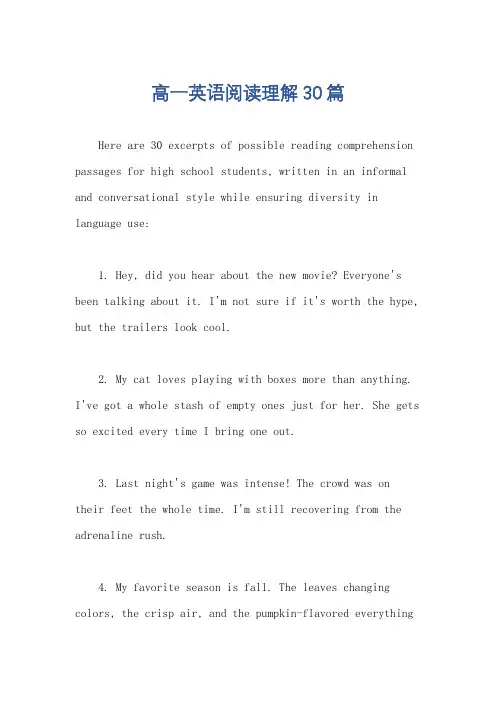
高一英语阅读理解30篇Here are 30 excerpts of possible reading comprehension passages for high school students, written in an informal and conversational style while ensuring diversity in language use:1. Hey, did you hear about the new movie? Everyone's been talking about it. I'm not sure if it's worth the hype, but the trailers look cool.2. My cat loves playing with boxes more than anything. I've got a whole stash of empty ones just for her. She gets so excited every time I bring one out.3. Last night's game was intense! The crowd was ontheir feet the whole time. I'm still recovering from the adrenaline rush.4. My favorite season is fall. The leaves changing colors, the crisp air, and the pumpkin-flavored everythingare just perfect.5. I've been meaning to try out that new restaurant downtown. Their menu looks amazing, and the reviews are all positive.6. Remember when we went camping last summer? The stars were so bright, it felt like we were in a different world.7. My dog is obsessed with chasing squirrels. He'll chase them for hours if given the chance. It's pretty funny to watch.8. My favorite thing to do on a rainy day is curl up with a good book and a cup of hot chocolate. It's the ultimate comfort combo.9. I can't believe summer's already over. It feels like it just flew by. I'm not ready for school to start again.10. Have you ever tried baking your own bread?。
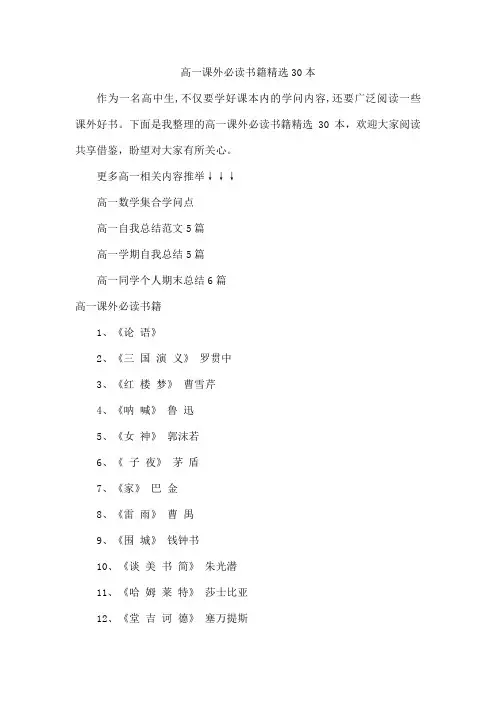
高一课外必读书籍精选30本作为一名高中生,不仅要学好课本内的学问内容,还要广泛阅读一些课外好书。
下面是我整理的高一课外必读书籍精选30本,欢迎大家阅读共享借鉴,盼望对大家有所关心。
更多高一相关内容推举↓↓↓高一数学集合学问点高一自我总结范文5篇高一学期自我总结5篇高一同学个人期末总结6篇高一课外必读书籍1、《论语》2、《三国演义》罗贯中3、《红楼梦》曹雪芹4、《呐喊》鲁迅5、《女神》郭沫若6、《子夜》茅盾7、《家》巴金8、《雷雨》曹禺9、《围城》钱钟书10、《谈美书简》朱光潜11、《哈姆莱特》莎士比亚12、《堂吉诃德》塞万提斯13、《歌德谈话录》艾克曼14、《巴黎圣母院》雨果15、《欧也尼葛朗台》巴尔扎克16、《匹克威克外传》狄更斯17、《复活》列·托尔斯泰18、《普希金诗选》普希金19、《老人与海》海明威20、《泰戈尔诗选》泰戈尔21、《西游记》吴承恩165322、《水浒》施耐庵23、《朝花夕拾》鲁迅24、《骆驼祥子》老舍25、《繁星·春水》冰心26、《鲁滨孙漂流记》(英)笛福27、《格列佛游记》(英)斯威夫特28、《名人传》(法)罗曼·罗兰29、《童年》(俄)高尔基30、《钢铁是怎样炼成的》(俄)奥斯特洛夫斯基课外阅读的好处一、课外阅读有助于同学形成良好的道德品行和健全的人格。
语文教学内容因其所含的丰富的人文精神,更具培育一代新人的优势。
大语文观就是要以人的进展为语文教学的根本目的,培育具有良好的道德品行,真诚、和善、美妙的心灵,敬重真理,富有责任心的健全的人格。
同学大量阅读富有人文精神的(童话(故事))、人物传记、少年小说、世界名著缩编本等,内心世界很简单产生震荡。
一部英国(儿童)小说《哈利.波特》,竟然制服了全世界,连成人都不禁为小仆人公的人格魅力所折服。
多读中国文学、优秀中华人物(事迹)更有必要:从屈原伏清白以死直的忠诚,李白安能摧眉弯腰事权贵的傲骨,范仲淹先天下之忧而忧,后天下之乐而乐的胸怀,文天祥留取心照汗青的豪情到鲁迅我以我血荐轩辕的赤子之心……几千年的民族精神,在这些文字中呼之欲出。
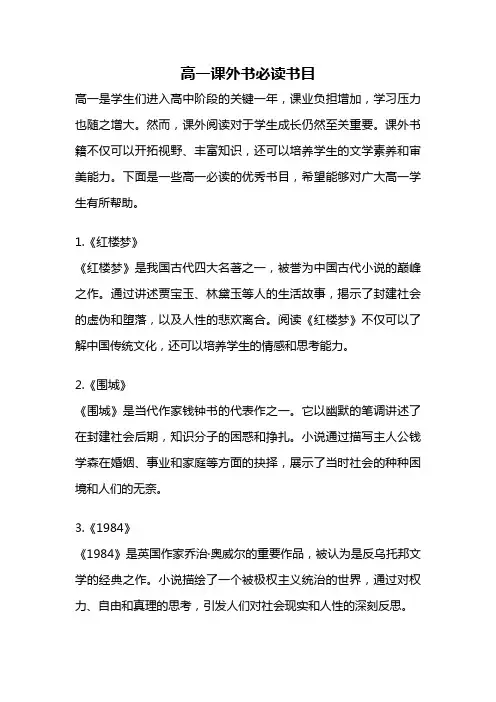
高一课外书必读书目高一是学生们进入高中阶段的关键一年,课业负担增加,学习压力也随之增大。
然而,课外阅读对于学生成长仍然至关重要。
课外书籍不仅可以开拓视野、丰富知识,还可以培养学生的文学素养和审美能力。
下面是一些高一必读的优秀书目,希望能够对广大高一学生有所帮助。
1.《红楼梦》《红楼梦》是我国古代四大名著之一,被誉为中国古代小说的巅峰之作。
通过讲述贾宝玉、林黛玉等人的生活故事,揭示了封建社会的虚伪和堕落,以及人性的悲欢离合。
阅读《红楼梦》不仅可以了解中国传统文化,还可以培养学生的情感和思考能力。
2.《围城》《围城》是当代作家钱钟书的代表作之一。
它以幽默的笔调讲述了在封建社会后期,知识分子的困惑和挣扎。
小说通过描写主人公钱学森在婚姻、事业和家庭等方面的抉择,展示了当时社会的种种困境和人们的无奈。
3.《1984》《1984》是英国作家乔治·奥威尔的重要作品,被认为是反乌托邦文学的经典之作。
小说描绘了一个被极权主义统治的世界,通过对权力、自由和真理的思考,引发人们对社会现实和人性的深刻反思。
4.《活着》《活着》是作家余华的代表作之一,通过讲述主人公福贵的一生,揭示了中国农村的苦难和历史的沧桑。
小说以其深刻的人物刻画和感人的故事情节,引发了广泛的社会关注和文学讨论。
5.《平凡的世界》《平凡的世界》是作家路遥的长篇小说,讲述了农村知识青年孙少平的成长历程。
小说通过对孙少平的家庭、学校和社会的描写,展现了中国改革开放时期农村人民的奋斗和生活状态,深刻反映了中国社会的变革和农村问题。
6.《西游记》《西游记》是我国古代四大名著之一,被誉为中国神魔小说的典范。
小说以孙悟空等人的西天取经之旅为主线,通过对仙魔、佛道等神话传说的描写,展示了人性的善恶、修行的重要性和正义的力量。
7.《百年孤独》《百年孤独》是哥伦比亚作家马尔克斯的代表作之一,被誉为拉丁美洲文学的经典之作。
小说通过讲述布恩迪亚家族七代人的故事,展示了拉丁美洲社会和历史的变迁。
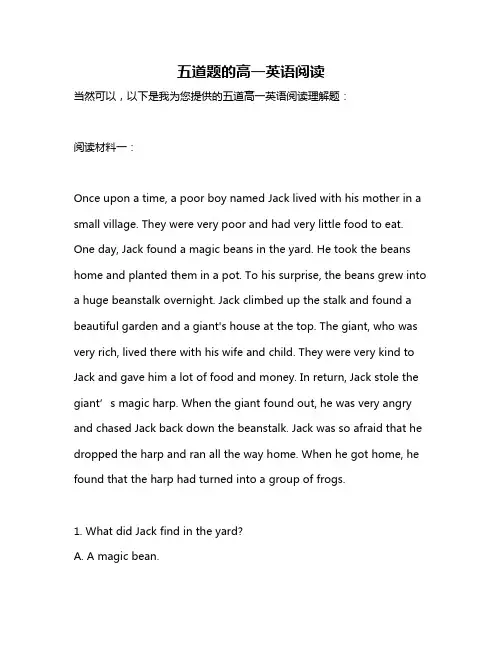
五道题的高一英语阅读当然可以,以下是我为您提供的五道高一英语阅读理解题:阅读材料一:Once upon a time, a poor boy named Jack lived with his mother in a small village. They were very poor and had very little food to eat. One day, Jack found a magic beans in the yard. He took the beans home and planted them in a pot. To his surprise, the beans grew into a huge beanstalk overnight. Jack climbed up the stalk and found a beautiful garden and a giant's house at the top. The giant, who was very rich, lived there with his wife and child. They were very kind to Jack and gave him a lot of food and money. In return, Jack stole the giant’s magic harp. When the giant found out, he was very angry and chased Jack back down the beanstalk. Jack was so afraid that he dropped the harp and ran all the way home. When he got home, he found that the harp had turned into a group of frogs.1. What did Jack find in the yard?A. A magic bean.B. A magic stick.C. A magic harp.D. A magic beanstalk.2. Why did Jack climb up the beanstalk?A. To find a beautiful garden and a giant’s house.B. To find a group of frogs.C. To find a rich man’s house.D. To find a magic stick.3. Who was the owner of the magic harp?A. The giant’s wife.B. The giant’s child.C. The giant himself.D. The poor boy’s mother.4. What did Jack do when he found the magic harp?A. He kept it for himself.B. He gave it back to the giant’s wife.C. He sold it to a rich man for money.D. He stole it and ran home quickly.5. What happened to the magic harp when it was dropped on the ground?A. It turned into a group of frogs.B. It disappeared in the air.C. It fell into a deep well.D. It was eaten by a cat.阅读材料二:Once upon a time, there was a poor boy named Tom who lived with his parents in a small town near the sea. They were very poor and often had nothing to eat but bread and water. One day, Tom’s father borrowed some money from a rich man and promised to pay him back in a few months. But when winter came, they still had no money to buy food or clothes, and Tom’s father became very ill because of t he cold weather and couldn’t work anymore. The family was in great need of help, but they didn’t know where to turn for help until one day, Tom met an old man on the beach who gave him a magic stone that could turn anything into gold. Tom was very happy and decided to use the stone to help his family out of poverty. However, he soon found that he couldn’t control his greed and turned everything he touched into gold, including his parents and himself, which caused them all to die because they couldn’t eat or drink anything but gold! Finally, Tom realized his mistake and threwaway the magic stone into the sea where it belonged so that no one else could use it again in the future.6. Why was Tom’s family poor?A. Because they were not hard-working enough.B. Because they were not clever enough to make money.C. Because they had too many children to feed and clothe.D. Because they had no money or property left after their father’s death.7. What did Tom’s father promise to do?A. Borrow some money from a rich man and pay him back in a few months later。
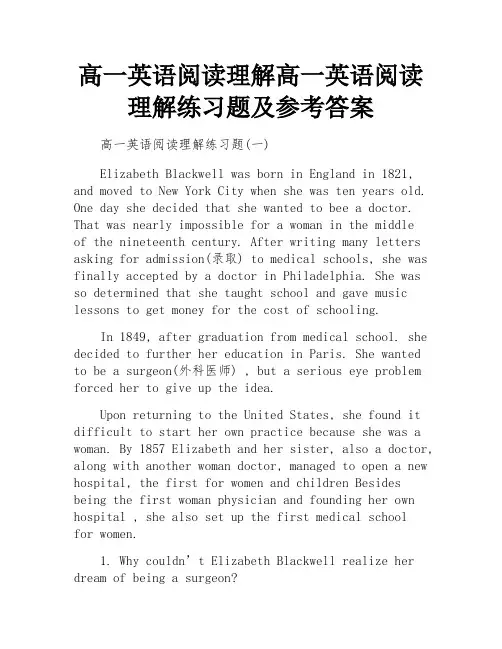
高一英语阅读理解高一英语阅读理解练习题及参考答案高一英语阅读理解练习题(一)Elizabeth Blackwell was born in England in 1821, and moved to New York City when she was ten years old. One day she decided that she wanted to bee a doctor. That was nearly impossible for a woman in the middleof the nineteenth century. After writing many letters asking for admission(录取) to medical schools, she was finally accepted by a doctor in Philadelphia. She was so determined that she taught school and gave music lessons to get money for the cost of schooling.In 1849, after graduation from medical school. she decided to further her education in Paris. She wanted to be a surgeon(外科医师) , but a serious eye problem forced her to give up the idea.Upon returning to the United States, she found it difficult to start her own practice because she was a woman. By 1857 Elizabeth and her sister, also a doctor, along with another woman doctor, managed to open a new hospital, the first for women and children Besides being the first woman physician and founding her own hospital , she also set up the first medical schoolfor women.1. Why couldn’t Elizabeth Blackwell realize her dream of being a surgeon?A. She couldn’t get admitted to medical schoolB. She decided to further her education in ParisC. A serious eye problem stopped herD. It was difficult for her to start a practice in the United States2. What main obstacle(障碍) almost destroyed Elizabeth’s chances for being for a doctor?A. She was a woman.B. She wrote too many letters.C. She couldn’t graduate from medical school.D. She couldn’t set up her hospital.3. How many years passed between her graduation from medical school and the opening of her hospital?A. Eight yearsB. Ten yearsC. Nineteen yearsD. Thirty-six years4. According to the passage, all of the following are “firsts” in the life of Elizabeth Blacekwell,except that she ______.A. became the first woman physicianB. was the first woman doctorC. and several other women founded the first hospital for women and childrenD. set up the first medical school for women5. Eilzabeth Blackwell spent most of her lift in _______.A. EnglandB. ParisC. the United StatesD. New York City高一英语阅读理解练习题答案1C 2 A 3 A 4 B 5 C高一英语阅读理解练习题(二)An expensive car speeding down the main street of a small town was soon caught up with by a young motorcycle policeman. As he started to make out the ticket, the woman behind the wheel said proudly, “Before you go any further, young man, I think you should know that the mayor of this city is a good friend of mine.”The officer did not say a word, but kept writing. “I am also a friend of chief of police Barens,”continued the woman, getting more angry each moment, Still he kept on writing. “Young man,”she persisted, “I know Judge Lawso n and State Senator (参议员) Patton.” Handing the ticket to the woman, the officer asked pleasantly , “Tell me, do you know Bill Bronson.”“Why, no,”she answered.“Well, that is the man you should have known,”he said, heading back to his motorcycle, “I an Bill Bronson.”1. The policeman stopped the car because_____A. it was an expensive carB. the driver was a proud ladyC. the driver was driving beyond the speed limitD. the driver was going to make trouble for the police2. The woman was getting more angry each moment because _____.A. the policeman didn’t know her friendsB. the policeman didn’t accept her kindnessC. the policeman was going to punish herD. she didn’t know the policeman’s name3. The policeman was _______.A. an honourable fellowB. a stupid fellowC. an impolite manD. a shy man4. The woman was _______.A. kind-heartedB. a person who depended on someone else to finish her workC. trying to frighten the policeman on the strength of her friends’ powerf ul positionsD. introducing her good friends’ names to the young officer5. The policeman _______.A. had no sense of humor (幽默)B. had s sense of humorC. had no sense of dutyD. was senseless。
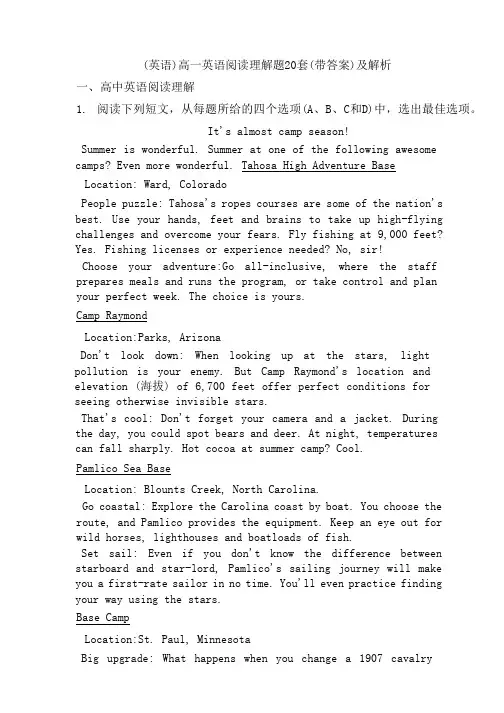
(英语)高一英语阅读理解题20套(带答案)及解析一、高中英语阅读理解1. 阅读下列短文,从每题所给的四个选项(A、B、C和D)中,选出最佳选项。
It's almost camp season!Summer is wonderful. Summer at one of the following awesome camps? Even more wonderful. Tahosa High Adventure BaseLocation: Ward, ColoradoPeople puzzle: Tahosa's ropes courses are some of the nation's best. Use your hands, feet and brains to take up high-flying challenges and overcome your fears. Fly fishing at 9,000 feet? Yes. Fishing licenses or experience needed? No, sir!Choose your adventure:Go all-inclusive, where the staff prepares meals and runs the program, or take control and planyour perfect week. The choice is yours.Camp RaymondLocation:Parks, ArizonaDon't look down: When looking up at the stars, light pollution is your enemy. But Camp Raymond's location and elevation (海拔) of 6,700 feet offer perfect conditions forseeing otherwise invisible stars.That's cool: Don't forget your camera and a jacket. Duringthe day, you could spot bears and deer. At night, temperaturescan fall sharply. Hot cocoa at summer camp? Cool.Pamlico Sea BaseLocation: Blounts Creek, North Carolina.Go coastal: Explore the Carolina coast by boat. You choose the route, and Pamlico provides the equipment. Keep an eye out forwild horses, lighthouses and boatloads of fish.Set sail: Even if you don't know the difference between starboard and star-lord, Pamlico's sailing journey will makeyou a first-rate sailor in no time. You'll even practice findingyour way using the stars.Base CampLocation:St. Paul, MinnesotaBig upgrade: What happens when you change a 1907 cavalrydrill hall(骑兵训练场) into an adventure destination in theheart of the city? You get Base Camp for overnight lock-ins, weekend retreats(隐居处) and summer camp.Inside out: Most of Base Camp is indoors, meaning the activities like climbing walls can be undertaken on winter's coldest days.(1) What do we know about Tahosa High Adventure Base?A. It requires fishing licensesB. It offers lessons on flying a planeC. It's a camp that is intended for brave kidsD. It is a camp where you can set your own pace(2) What can be learned in Pamlico Sea Base?A. How to tell starboard from star-lordB. How to choose camping equipmentC. How to use the stars for directionsD. How to make a boat on your own(3) In which camp can kids climb walls inside on winter days?A. Base Camp.B. Camp Raymond.C. Pamlico Sea Base.D. Tahosa High Adventure Base.【答案】 (1) D(2)C(3)A【解析】【分析】本文是一篇应用文,介绍了四个精彩的·夏令营活动。
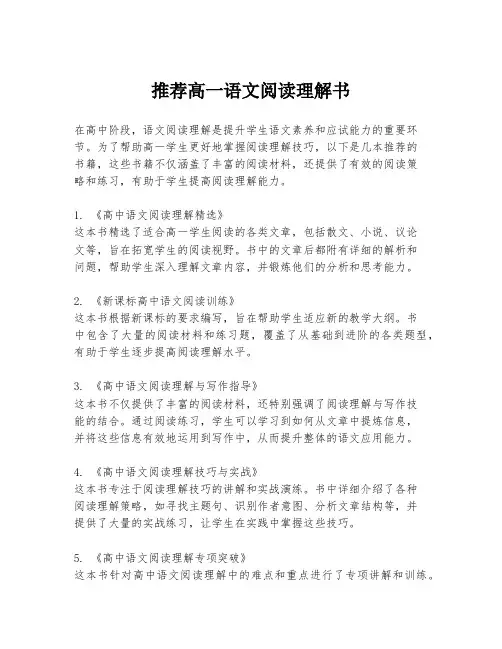
推荐高一语文阅读理解书在高中阶段,语文阅读理解是提升学生语文素养和应试能力的重要环节。
为了帮助高一学生更好地掌握阅读理解技巧,以下是几本推荐的书籍,这些书籍不仅涵盖了丰富的阅读材料,还提供了有效的阅读策略和练习,有助于学生提高阅读理解能力。
1. 《高中语文阅读理解精选》这本书精选了适合高一学生阅读的各类文章,包括散文、小说、议论文等,旨在拓宽学生的阅读视野。
书中的文章后都附有详细的解析和问题,帮助学生深入理解文章内容,并锻炼他们的分析和思考能力。
2. 《新课标高中语文阅读训练》这本书根据新课标的要求编写,旨在帮助学生适应新的教学大纲。
书中包含了大量的阅读材料和练习题,覆盖了从基础到进阶的各类题型,有助于学生逐步提高阅读理解水平。
3. 《高中语文阅读理解与写作指导》这本书不仅提供了丰富的阅读材料,还特别强调了阅读理解与写作技能的结合。
通过阅读练习,学生可以学习到如何从文章中提炼信息,并将这些信息有效地运用到写作中,从而提升整体的语文应用能力。
4. 《高中语文阅读理解技巧与实战》这本书专注于阅读理解技巧的讲解和实战演练。
书中详细介绍了各种阅读理解策略,如寻找主题句、识别作者意图、分析文章结构等,并提供了大量的实战练习,让学生在实践中掌握这些技巧。
5. 《高中语文阅读理解专项突破》这本书针对高中语文阅读理解中的难点和重点进行了专项讲解和训练。
书中的练习题设计科学合理,既有针对性,又有趣味性,能够有效激发学生的学习兴趣,帮助他们在阅读理解上取得突破。
选择适合自己学习需求的书籍,结合课堂学习,进行系统的训练,相信高一的学生们在阅读理解方面一定能够取得显著的进步。
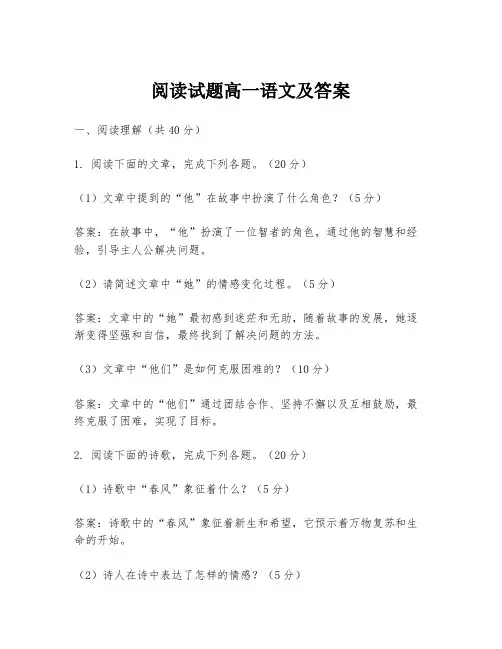
阅读试题高一语文及答案一、阅读理解(共40分)1. 阅读下面的文章,完成下列各题。
(20分)(1)文章中提到的“他”在故事中扮演了什么角色?(5分)答案:在故事中,“他”扮演了一位智者的角色,通过他的智慧和经验,引导主人公解决问题。
(2)请简述文章中“她”的情感变化过程。
(5分)答案:文章中的“她”最初感到迷茫和无助,随着故事的发展,她逐渐变得坚强和自信,最终找到了解决问题的方法。
(3)文章中“他们”是如何克服困难的?(10分)答案:文章中的“他们”通过团结合作、坚持不懈以及互相鼓励,最终克服了困难,实现了目标。
2. 阅读下面的诗歌,完成下列各题。
(20分)(1)诗歌中“春风”象征着什么?(5分)答案:诗歌中的“春风”象征着新生和希望,它预示着万物复苏和生命的开始。
(2)诗人在诗中表达了怎样的情感?(5分)答案:诗人在诗中表达了对美好生活的向往和对自然美景的赞美之情。
(3)请分析诗歌中的修辞手法及其作用。
(10分)答案:诗歌中运用了拟人、比喻等修辞手法,通过这些手法,诗人赋予了自然景物以生命和情感,增强了诗歌的感染力和艺术表现力。
二、现代文阅读(共30分)1. 阅读下面的文章,完成下列各题。
(15分)(1)文章的主旨是什么?(5分)答案:文章的主旨是探讨人与自然和谐共生的重要性。
(2)作者通过哪些事例来支持自己的观点?(5分)答案:作者通过描述环境污染、生态破坏等事例来支持自己的观点。
(3)文章中提到的“绿色发展”是什么意思?(5分)答案:文章中提到的“绿色发展”指的是在经济发展的同时,注重环境保护和资源节约,实现可持续发展。
2. 阅读下面的议论文,完成下列各题。
(15分)(1)文章的论点是什么?(5分)答案:文章的论点是教育应该注重培养学生的创新能力和实践能力。
(2)作者使用了哪些论证方法?(5分)答案:作者使用了举例论证、对比论证和因果论证等方法。
(3)文章中提到的“终身学习”对个人发展有什么意义?(5分)答案:文章中提到的“终身学习”意味着个人应该持续不断地学习新知识、新技能,以适应社会的发展和变化,对个人的职业发展和生活质量有着重要的意义。
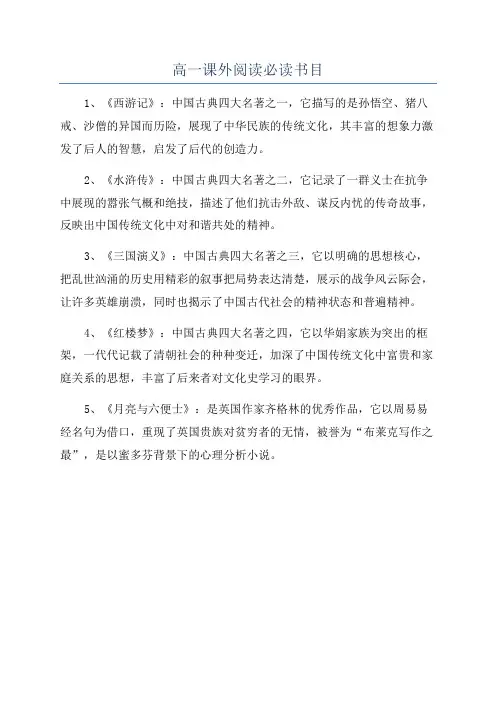
高一课外阅读必读书目
1、《西游记》:中国古典四大名著之一,它描写的是孙悟空、猪八戒、沙僧的异国而历险,展现了中华民族的传统文化,其丰富的想象力激发了后人的智慧,启发了后代的创造力。
2、《水浒传》:中国古典四大名著之二,它记录了一群义士在抗争中展现的嚣张气概和绝技,描述了他们抗击外敌、谋反内忧的传奇故事,反映出中国传统文化中对和谐共处的精神。
3、《三国演义》:中国古典四大名著之三,它以明确的思想核心,把乱世汹涌的历史用精彩的叙事把局势表达清楚,展示的战争风云际会,让许多英雄崩溃,同时也揭示了中国古代社会的精神状态和普遍精神。
4、《红楼梦》:中国古典四大名著之四,它以华娟家族为突出的框架,一代代记载了清朝社会的种种变迁,加深了中国传统文化中富贵和家庭关系的思想,丰富了后来者对文化史学习的眼界。
5、《月亮与六便士》:是英国作家齐格林的优秀作品,它以周易易经名句为借口,重现了英国贵族对贫穷者的无情,被誉为“布莱克写作之最”,是以蜜多芬背景下的心理分析小说。
高一阅读理解英语(通用5篇)高一阅读理解英语(1)阅读题如何做?先读题,在看文章。
抓住问题的关键点,比如why,what等以及关键词句。
读文章,不用词词抠。
英语阅读中难免有自己不认识的单词,如果是考试遇到,不用每一个句子都要弄得很明白,根据语感猜测词义,知道文章大概的意思,重点研究的是和题有关的关键句的意思,关键句中你不明白的单词也就是重点需要抠的单词了。
阅读文章是读两遍。
第一遍是大概浏览,第二遍是找到与题有关的关键句子做题。
完型填空如何做?通读一遍后再开始做题。
首先通读一遍了解大概的意思,疏通文章,同时填写一些比较明显的答案,标注自己不明白的句子。
第二遍主要依靠语感,次要依靠文中的关键词句猜测应该填写什么词。
第三遍检查,可以进一步深化对文章的了解,从而进行纠错。
作文如何做?作文最重要的一点就是在于平时的积累,如果你现在急于提高自己的作文,那么最好的就是背诵一些好的句子,其次重点就是注意自己的书写。
做题的顺序如何?有舍才有得,一开始没有想上来的题先放下,因为你第一次就没有思考上来的题是因为你不熟悉,你要花时间去回想,有可能会耽误自己做题,所以在最后剩下一定的时间再去回想在做。
其次我建议根据自己的能力不同,先做最为熟练的最为拿手的,这样会为你之后的题争取大量的时间。
英语不好,一般都是停滞在单词以及语法上,那么如果你的时间充足,就尽量重新去学习一边语法,如果时间不够,那么就以培养语感为主,英语的考试越来越重视语感的考查,我建议通过每天读一篇课文,效果显著。
单词上就是每一天的积累了,需要自己付出更多的努力。
高一阅读理解英语(2)浏览试题,明确要求。
在阅读文章前,最好先浏览一下文章后面的题干和选项。
知道了问题后再去看文章,可使思路更敏捷,而且也便于阅读时留意文中出现的与选项有关的信息。
通读全文,抓住主要内容,要在不影响理解的前提下,尽可能地阅读以便在尽可能短的时间内理解文章或段落的内容。
阅读时,如遇到不熟悉的单词、词组或一时看不懂的句子,不要停下来苦思冥想,继续读下去,通过上下文的词语和句子可能就理解了。
高一试题及答案语文一、现代文阅读(共36分)(一)论述类文本阅读(本题共3小题,9分)阅读下面的文字,完成1~3题。
在人类文明的早期,人们就已经开始对宇宙进行探索。
从古代的天象观测到现代的宇宙探测,人类对宇宙的认识不断深化。
随着科学技术的发展,人类对宇宙的探索方式也发生了变化。
1. 下列关于原文内容的理解和分析,正确的一项是(3分)A. 人类对宇宙的探索始于古代的天象观测。
B. 科学技术的发展使得人类对宇宙的认识不断深化。
C. 人类对宇宙的探索方式随着科学技术的发展而发生了变化。
D. 现代宇宙探测技术已经完全取代了古代的天象观测。
2. 根据原文,下列不属于人类对宇宙探索方式变化的原因的一项是(3分)A. 科学技术的进步。
B. 人类对宇宙认识的深化。
C. 古代天象观测的局限性。
D. 人类对宇宙探索的好奇心。
3. 下列对原文论证的相关分析,不正确的一项是(3分)A. 文章首先介绍了人类对宇宙探索的历史。
B. 文章接着分析了科学技术对宇宙探索方式的影响。
C. 文章最后指出了人类对宇宙探索方式变化的原因。
D. 文章通过对比古代和现代的宇宙探索方式,强调了科学技术的重要性。
(二)文学类文本阅读(本题共3小题,15分)阅读下面的文字,完成4~6题。
《荷塘月色》(节选)朱自清这几天心里颇不宁静。
今晚在院子里坐着乘凉,忽然想起日日走过的荷塘,在这满月的光里,总该另有一番样子吧。
月亮渐渐地升高了,墙外马路上孩子们的欢笑,已经听不见了;妻在屋里拍着闰儿,迷迷糊糊地哼着眠歌。
我悄悄地披了大衫,带上门出去。
沿着荷塘,是一条曲折的小煤屑路。
这是一条幽僻的路;白天也少人走,夜晚更加寂寞。
荷塘四面,长着许多树,蓊蓊郁郁的。
路的一旁,是些杨柳,和一些不知道名字的树。
没有月光的晚上,这路上阴森森的,有些怕人。
今晚却很好,虽然月光也还是淡淡的。
4. 下列对文本相关内容和艺术特色的分析鉴赏,不正确的一项是(3分)A. 文章开头直接点明作者心情的不宁静,为全文奠定了感情基调。
高一语文学习中的课外阅读推荐有哪些对于高一的学生来说,语文学习不仅仅局限于课本知识,广泛的课外阅读能够极大地拓展视野、提升素养和丰富情感。
那么,有哪些适合高一学生的课外阅读书籍呢?首先,经典文学作品是必不可少的。
《红楼梦》就是一部值得深入研读的巨著。
这部作品以贾、史、王、薛四大家族的兴衰为背景,描绘了众多性格鲜明的人物形象,展现了封建社会的百态人生。
通过阅读,同学们可以领略到中国传统文化的博大精深,感受细腻的人物刻画和复杂的情节发展,对于提升文学鉴赏能力和写作水平大有裨益。
《呐喊》是鲁迅先生的经典之作。
他以犀利的笔触揭示了社会的种种问题和人民的苦难,充满了对社会的深刻思考和对人性的洞察。
阅读这部作品,可以让我们了解那个时代的风貌,同时也能培养我们的社会责任感和批判思维能力。
《巴黎圣母院》也是一本不容错过的好书。
它以离奇的情节和对比鲜明的人物形象,揭示了美与丑、善与恶的尖锐对立。
让我们在感受法国浪漫主义文学魅力的同时,也对人性的复杂性有更深刻的认识。
除了经典文学,传记类作品也是不错的选择。
《苏东坡传》可以让我们了解到苏轼这位文学巨匠的一生。
他在坎坷的人生道路上始终保持着乐观豁达的心态,其诗词文章更是脍炙人口。
通过阅读他的传记,同学们能从中汲取面对困难的勇气和力量,同时也能欣赏到他卓越的文学才华。
《居里夫人传》则向我们展现了一位伟大科学家的奋斗历程。
居里夫人克服重重困难,坚持科学研究,最终为人类做出了巨大的贡献。
她的坚韧、执着和对科学的热爱,无疑会给同学们带来激励和启发。
在历史文化方面,《史记》是一部具有重要价值的书籍。
它是中国第一部纪传体通史,记载了从黄帝到汉武帝时期的历史。
阅读《史记》,可以帮助我们了解中国古代的政治、经济、文化等各个方面的情况,同时也能欣赏到司马迁精彩的叙事和生动的人物描写。
《万历十五年》则以独特的视角解读了明朝的一段历史。
作者黄仁宇通过对几个关键人物和事件的分析,揭示了明朝社会存在的种种问题。
高一必读12本名著高一必读12本名著有:1.《乡土中国》《乡土中国》是费孝通先生著述的一部研究中国农村社会的作品。
全书由12篇文章组成,作者用通俗简洁的语言对中国基层社会的主要特征进行概述分析,全面展现了中国基层社会的面貌。
注:作为部编版语文高一上的整本书阅读书目,各位同学可以在暑假读起来了。
2.《红楼梦》曹雪芹是中国文学史上最伟大也是最复杂的作家,《红楼梦》也是中国文学史上最伟大最复杂的作品。
《红楼梦》以贾宝玉、林黛玉、薛宝钗之间的爱情、婚姻悲剧为中心,写出了当时一个具有代表性的贵族大家庭的兴衰变化,写出以贾宝玉和一群红楼女子为中心的许多人物的悲剧命运,她们所代表的青春、爱情、生命之美及这种美的种种被毁灭,反映了具有一定觉醒意识的青年男女在封建体制和封建家长遏制下的历史宿命,写出了耽溺痛苦的人生真相和希求解脱的共同向往,写出了矛盾的感情世界和真实的人生体验。
《红楼梦》在艺术表现方面也是我国古典小说的最高峰。
注:《红楼梦》是部编版高一下语文的整本书阅读书目,同学们也可以在升高中的暑假提前阅读。
3.《古文观止》高中文言文难度相比初中有很大的提升,各位同学有必要在高一阶段就开始夯实文言文基础。
《古文观止》集中国历代散文精华之大成,是自清以降的文言启蒙读物,与《唐诗三百首》并称为中国古诗文选本的“双壁”,鲁迅赞之与《昭明文选》并美。
是非常好的提升文言文水平的阅读书目。
4.《论语译注》杨伯峻《论语译注》系在精研《论语》的基础上,对《论语》二十篇进行了精确细致的注释和翻译。
每章分为原文、注释、译文三部分,注释精准,译文流畅明白。
5.《呐喊》鲁迅推荐理由:鲁迅的短篇小说写得最好,现代作家无人能比。
鲁迅对国民性的批判不因时间流逝而过时,反随时间流逝让人们的理解更加深刻。
6.《我与地坛》或《病隙碎笔》史铁生推荐理由:身体残疾的史铁生弹奏出的生命强音。
读史铁生的书,培养生命的韧性,拥有一颗健全明朗的心。
7.《名人传》罗曼·罗兰推荐理由:奋斗不息的生命交响曲。
【英语】高一英语阅读理解专项训练100(附答案)及解析一、高中英语阅读理解1.阅读理解Three boys were enjoying themselves in their hometown of Bovina, Mississippi .However, their lives were turned upside down when they discovered the jawbone of a Mastodon (齿乳象).Brothers Shawn and Caid Sellers and cousin Michael Mahalitc found the prehistoric bone in a piece of earth that was recently plowed (犁、耕)."I thought it was a log," Caid said. "I tried to pick it up and it was really heavy and I saw teeth on it." The bone weighed about 50 pounds. They eventually got the bone to their home and fitted it in their tub (浴盆), but it took their collective strength, might and a golf cart, to carry the large Mastodon bone."They didn't expect to find that," Michael's mom said. "Now that they have, I believe that they will be more aware of their surroundings and what they're digging up when they are digging and playing.""We've gotten a lot of petrified (石化的) wood and Civil War relics from the area and that's what I thought it was," the brothers' mother said. "This is our first set of teeth we've found. So we thought it was their imagination. We were quite surprised to see that it was not their imagination."They were exploring near the brothers' home. Lo and behold (真想不到), they saw what they thought resembled a fossil. It was the curator of paleontology (古生物负责人) of the Mississippi Museum of Natural Science, George Phillips, who first identified the bone as a "very mature individual."The Mastodon was a mammal who lived during the prehistoric times. They had long tusks and trunks, like elephants. They were clearly different from their modern-day counterparts, as well as woolly mammoths (猛犸).(1)How did they find the jawbone of a Mastodon?A. With great efforts.B. By chance.C. Instructed by an expert.D. Through imagination.(2)At first the brothers' mother thought the jawbone was .A. from people who died in the Civil WarB. the bone from a very mature individualC. like a log or somethingD. the prehistoric bone(3)The discovery of the jawbone of a Mastodon is important mainly because it .A. helps people to know more about the Civil WarB. teaches kids to be more aware of their surroundingsC. promotes the research on more prehistoric creaturesD. attracts the Mississippi Museum of Natural Science(4)Which of the following can be the best title for the article?A. Prehistoric Bones Recently Found in MississippiB. Not Petrified Wood Nor Civil War RelicsC. First Identifying Bone as a "Very Mature Individual"D. Unexpectedly Discovering Mastodon Jawbone【答案】(1)B(2)A(3)C(4)D【解析】【分析】本文是一篇记叙文,美国密西西比的三个男孩在玩耍的时候无意中发现了齿乳象的颚骨,起初他们并不知道这是史前生物的遗骸,所发现的遗骸对史前生物的研究有较强的促进作用。
【导语】在⾼⼀的学习过程中,做好每⼀道阅读理解题,有利于我们提⾼学习成绩。
下⾯是⽆忧考收集整理的⾼⼀语⽂阅读理解题⽬及其参考答案以供⼤家学习。
⾼⼀语⽂阅读理解(⼀) 我曾经想过,如若⼈们开始爱惜光阴,那末他的⽣命的积储是有—部分耗蚀的了。
年青⼈往往不知珍惜光阴,犹如拥资巨万的富家⼦,他可以任意挥霍他的钱财,等到黄⾦垂尽便吝啬起来,⽽懊悔从前的浪费了。
最近的⼀个秋⽇的傍晚,我在近郊散步,我迎着苍黄的落⽇⾛过去,复背着它的光辉⾛回来,⾜踩着⾃⼰的影⼦。
“我是牵着我的思想在散步,”我对⾃⼰说,“我是踪蹑着我的影⼦,看我赶不赶得过它?”我携着我的思想⼀同散步。
它是羞怯得畏见阳光,⽼躲在我的影⼦⾥。
使得我和它谈话,不得不偏过头去,伛偻着⾝⼦,正如⼀个⾼⼤的男⼦低头和⾝边的⼥⼦说话,是那么轻声地,絮絮地。
我们⾛着⾛着,不知从哪⾥来的⼀枚树叶,飘坠在我们的脚前。
那样轻,怕跌碎的样⼦。
要不是四周是那么静寂,我准不会注意。
但我注意到了,我捡了起来,我试想分辨它是什么树叶?梧桐的,枫树的,还是樗栎的?但我恍若看到这不是⼀张树叶,分明是⼀张⽇历,⼀张被不可见的⼿扯下来的⽇历。
这上⾯写着的是⼀个⽆形的字:“秋。
” “秋!”我微喟⼀声。
“秋,秋。
”我的思想躲在我的影⼦⾥和答我。
我感到有点迟暮了。
好像这个字代表⼀段逝去的光阴。
“逝去的光阴。
”我的思想如刁钻的精灵,摸着了我的⼼思。
“光……阴。
”这两个平声的没有低昂的字眼,在我的⽿边震响。
光阴要逝去么?却借落叶通知我。
我岂不曾拥有过⼤量的光阴,这年青⼈的财产,⼀如富贾之⼦拥有巨资。
我曾是光阴富有者。
同时我也想起了两个惜阴的⼈。
正是这样秋暖的⽇⼦,在很早很早以前。
家门前的⽲场上排列着⼀⾏⾏的⾕簟,在阳光下曝晒着⽥⾥新收割来的⾕粒。
芙蓉花盛开着。
我坐在它的荫下,坐在⼀只⽵箩⾥⾯——我的⾝⼦还装不满⼀⽵箩——玩着⾕堆⾥捉来的蚱蜢螳螂和甲⾍,我玩着玩着,⽆意识地玩去我的光阴。
高一英语阅读理解专练(A)Do you want to know something about the history of weather? Don’t look at the sky. Don’t look for old weather reports. Looking at tree rings is more important. Correct weather reports date back only one century, but some trees can provide an exact record of the weather even further back.It is natural that a tree would grow best in a climate with plenty of sunlight and rainfall. It is also expected that little sunlight and rainfall would limit the growth of a tree. The change from a favorable to an unfavorable climate can be determined by reading the pattern of rings in a tree trunk. To find the weather of ten years ago, count the rings of a tree trunk from the outside to the inside. If the tenth ring is far from the other rings, then it is certain that plenty of sunny and rainy weather occurred. If the rings are closed together, then the climate was bad for the tree.Studying tree rings is important not only for the history of weather, but also for the history of man. In a region of New Mexico you can find only sand---no trees and no people. However, many centuries ago a large population lived there. They left suddenly. Why?A scientist studied patterns of dead tree rings which had grown there. He decided that the people had to leave because they had cut down all the trees. Trees were necessary to make fires and buildings. So, after the people destroyed the trees, they had to move. In this instance studying tree rings uncovers an exciting fact about the history of man.1. It is understood that in a favorable climate ________.A. tree rings grow togetherB. tree rings grow far apartC. trees in New Mexico will grow big and tallD. people can cut down most of the trees in New Mexico2. The scientists are interested in studying tree rings because they can tell ___.A. whether in that area the climate was favorable or notB. whether a particular tree was healthy or notC. whether people took good care of the trees or notD. how old the trees were3. By studying the dead tree rings, the scientist discovered ___.A. where the people had leftB. what the people used to eatC. how the people leftD. why the people had to leave4. The people had to leave the region of New Mexico because ___.A. they had cut down all the treesB. there were many trees thereC. they had no waterD. bad weather stopped the growth of trees5. The main idea of the passage is _________.A. tree rings reflect the history of weather and the history of manB. destroying tree will do man no goodC. studying tree ring is the only way to know the history of weatherD. m an shouldn’t cut so many trees1--5 BADAA第二节完形填空阅读下面短文,掌握其大意,然后从36—55各题所给的四个选项(A、B、C和D)中,选出最佳选项。
We were about to gather up our things and return to our car 16 a man appeared. He looked very annoyed (恼怒的) and asked us 17_ if we 18 that these grounds were private property (财产). He ___19___ a notice __20___ said that camping was not allowed. 21 father explained that he ___22___ the notice and did not know the camping was not allowed. _23 father apologized, the man did not seem 24 and asked him for his name and address. All the way home, we were so __25__that hardly anyone spoke a word.For the 26 the week, we wondered what would happen. The following Sunday we stayed at home 27 it was a fine day. About noon, a large and very expensive car stopped outside our house. We were surprised when we saw several people __28 to have a picnic in our small garden. Father got very ___29__ and went out to ask them 30 they knew what they were doing. He was 31 to see that one of them was the man who had taken Father’s 32 the week 33 .__34___ of them began laughing and father welcomed the strangers into the house. In time, we became good friends, but we learned a lesson we have 35 forgotten.16. A. because B. when C. while D. as17 A. politely B. quietly C. angrily D. sadly18 A. realized B. promised C. doubted D. wondered19. A. put up B. held C. pointed to D. prepared for20. A. what B. which C./ D. where21. A. Happy B. Angry C. Poor D. Rich22. A. had seen B. has not seen C. saw D. did not see23. A. When B. Since C. Though D. Because24. A. shocked B. inspired C. satisfied D. annoyed25. A. pleased B. tired C. sleepy D. upset26. A. rest of B. next C. following D. last27. A. though B. as C. as if D. since28. A. to prepare B. to be preparing C. preparing D. prepare for29. A. angry B. excited C. glad D. amused30. A. that B. whether C. what D. so that31. A. surprised B. surprising C. sorry D. tired32. A. things B. name C. car D. property33. A. before B. later C. recently D. ago34. A. None B. Both C. Neither D. All35. A. ever B. never C. still D. yet完型:16-20:BCACB 21-25CDCCD 26-30 AACAB 31-35 ABABBWhen Mt Vesuvius erupted (爆发)in 79 A.D, it destroyed the cities of Pompeii and Herculaneum. The first excavators (挖掘者)were the people of Pompeii who, 1 to their city when the eruption stopped, dug down through the 2 of their buried homes and salvaged (抢救)what they could 3 their furniture and 4 . the tunnels they 5 through the solidified ash can still be seen in place. But a time came 6 Pompeii and Herculaneum were forgotten. Throughout the Middle Age these two buried cities were not 7 . and it was not until 1709 8 an Austrian prince sank a shaft at Herculaneum then, by means of underground tunnels, 9 the city of its treasures, in 1729 systematic(系统地)excavation began on the same site.From the end of the eighteenth century to the present day, digging had gone practically continuously,_ 10 slowly, and often with few resources. Perhaps this slowness has not been entirely a11 ., since it has resulted in large, untouched sections of both cities left preserved for modern, scientific12 . Archeological(考古学的)techniques have 13 so much in the last fifty years that a 14 cannow be shown far more archeological information than was possible before. Today most of Pompeii anda substantial section of Herculaneum have been 15 . They are the best archaeological sites in16 , and the most wonderful. For here, and 17 else on earth are ancient cities in which 18 did not die out but was suddenly 19 . “Behind these walls”, as one writer has said, “lies an ancient Italian town, stilled in a moment of time. To enter the 20 of this city is to walk 2000 years in the past.1. A. arriving B. retuning C. coming D. going2. A. walls B. floors C. gates D. roofs3. A. of B. from C. out of D. in4. A. thing B. tools C. ownings D. belongings5. A. went B. got C. drove D. moved6. A. when B. and C. that D. until7. A. discovered B. researched C. disturbed D. reached8. A. when B. that C. before D. after9. A. stole B. removed C. cured D. robbed10 A. but B. though C. even D. despite11. A. mistake B. wrong--doing C. advantage D. disadvantage12. A. discovery B. research C. excavation D. foundation13. A. improved B. changed C. added to D. enlarged14. A. spot B. site C. place D. position15. A. thrown B. stopped C. removed D. cleared16. A. Africa B. Asia C. America D. Europe17. A. somewhere B. anywhere C. nowhere D. everywhere18. A. human being B. life C. citizens D. animals19. A. arrested B. found C. seen D. discovered20. A. walls B. gates C. center D. roofs二、1-5 BDADC 6-10 ACBDB 11-15 DCABD 16-20 DCBABALong long ago, a God called Ratu lived in the sky. Ratu liked to play games and make people angry. The game he liked best was to fly down into the sea and frighten all the fishes. The fishes became very tired of his game. They asked Hemi, the God of the sea, to help them.So Hemi tried to catch Ratu the next time he flew into the sea, but he was too slow. Ratu laughed atHemi as he flew past him. This made Hemi angry and he had an idea. He asked the fishes to bring him a lot of seaweed. Hemi tied it all together and made a large net from it. Soon Ratu flew down and Hemi threw the net over him. Ratu fought and fought but could not get free. He was caught.Ratu promised (保证) never to frighten fishes again if Hemi would set him free. But Hemi did not believe him. Instead, he changed Ratu into a mountain in the sea. Ratu was so angry that when he opened his mouth to shout at Hemi, fire and smoke broke out. And that is why the Island of Ratu is a volcano (火山).1. This story is a ________.A. jokeB. humorC. true storyD. fairy tale2. The key meaning of this story is ________.A. how volcanoes are bornB. how Ratu was beatenC. why some gods are good and some are badD. why the Island of Ratu is a volcano3. Ratu liked to fly down into the sea because ________.A. he liked to make fun of the fishesB. the fishes welcomed himC. the fishes were friendly to himD. he had too much fire in his mouth.4. Why did Hemi not believe Ratu’s promise?A. Because Ratu was a funny god.B. Because Hemi was an honest god.C. Because Hemi was not believable.D. Because Ratu was believable.5. The main point of the story seems to be that ________.A. the person who makes trouble will be punishedB. some volcanoes in the sea are godsC. seaweed is a good material for making netsD. one who makes promises is not to be always believed三、1—5 DDADAAAdvertising gives useful information about which products to buy. But modern advertising does more than gives news about products and services. Today’s advertisements , or ads, try to get consumers(消费者) to buy certain brands(品牌) . Writers of advertising are so skillful that they can. sometimes persuade a consumer to wear a certain kind of clothing, eat a special kind of cereal(麦片) , orsee a movie. Consumers might never even want a product if they did not see or hear advertisements for it.For example, you probab1y do not need the newest cereal in the supermarket. There are probably many cereal brands on your kitchen shelves. You may not have space on a shelf for another. But if you see ads about a new cereal that is your extra-tasty and has a free prize in the box, you may want it.Advertising must get attention. To be effective, it must be exciting, entertaining, or provide some pleasure. The secret of writing good advertising copy is to offer a good idea as well as a product. The idea is what the ad is really selling. One example is an ad that says eating a certain cereal will make a person do well in sports. That cereal brand may sell better if consumers think it offers strength and energy.1. What is discussed in this passage?A. The content of modern advertising.B. The skills of modern advertising.C. The results of modern advertising.D. The writing of modern advertising.2. According to the passage, a good advertisement should .A. be both persuasive and effectiveB. give people useful informationC. show people a productD. show people a new idea of a product3. From the passage, we know that .A. modern advertising has less effect on customersB. once customers see ads about a new cerea1, they are sure to buy itC. cereal can make people strongD. cereal is a kind of food which is popular among people4. What can we infer from the passage?A. Customers can easily be persuaded by advertisements.B. Customers should be persuaded by advertisements.C. It’s impossible for customers to buy a product without advertisements.D. Customers buy products according to their demands rather than the advertisements.A:BADAAs we all know, it was Thomas Jefferson who wrote the Declaration of Independence (《独立宣言》). He wrote it in two weeks, and after a few changes, it was accepted by the Congress (国会). As a result, he became famous.Born in Virginia, Thomas Jefferson, a brilliant student at school and almost talented lawyer later, was much interested in politics.Jefferson was elected the Governor of Virginia in 1779, and he was sent to France as the representative of the American government in 1784. Sixteen years later, at the age of 57, he was elected president after Washington and Adams.Far from a handsome man, he was tall with long arms and big hands. Jefferson, who was an amusing talker in conversation but a poor speaker, was generally good-natured. Jefferson was regarded as a defender of freedom in America. As a president, he protected the right of free speech. Interestingly enough, in his eight years as president, Jefferson never vetoed (否决) a bill which the Congress had passed. He did a lot in organizing the new University of Virginia.Thomas Jefferson died on July the fourth, 1826, the fiftieth anniversary of American Independence.1. From the passage we can infer that America won its independence in _______.A. 1786B. 1800C. 1842D. 17762. How old was Thomas Jefferson when he became the Governor of Virgina?A. He was 26.B. He was in his forties.C. He was 36.D. We don’t know.3. Which of the following statements is TRUE?A. Jefferson wan an amusing talker, but not good at speaking in public.B. Jefferson was not an easy person to get along with.C. Jefferson was not only very talented but also very handsome.D. Not being politically minded, Jefferson never vetoed a bill passed by the Congress.4. Jefferson died when he was ________.A. 72B. 83C. 73D. 925. Jefferson’s greatest contribution in American history should be that ________.A. he did a lot in organizing the new University of Virginia.B. he was strongly against the slaveryC. he wrote the Declaration of IndependenceD. he was for the right of free speech1. D2. C3. A4. B5. C阅读文章,了解其大意,然后选择正确选项填空。